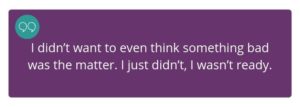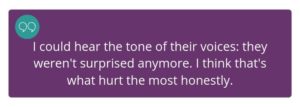
Part 1 of My Fibroid Story: My Relationships Were Affected
Disclaimer: For privacy purposes, all information including names of patients and dates have been changed or summarized. Direct quotes were shared with us specifically for awareness purposes. Every woman’s experience is unique; therefore, symptoms and recovery times may slightly vary.
The Beginning
Kaylee, 36, sits down with us to share her experience of living with uterine fibroids. “In the beginning, it was nothing. I had heavier periods but I got through them and it was fine.” For many women, a common symptom of uterine fibroids is having heavy periods lasting for more than 10 days per month.
“I probably had heavy periods for like two to three years. I didn’t think anything of it, you know?” shared Kaylee as she shifted in her seat, “I started taking five to six ibuprofens every day during my period and my doctor kept telling me it was normal. I didn’t like relying on pain meds because if I forgot them at home, I had to cancel my plans and drive all the way home.” Like Kaylee, many women experience the devastating affects of fibroids. They may begin, almost unnoticed, until they worsen causing painful symptoms that interrupt daily life. Relying on over-the-counter pain medications may become a daily occurrence.
Kaylee shares, “I didn’t really start thinking anything was that wrong until it was getting extremely painful to have sex.” Depending on their size and location, fibroids may cause sex to be extremely painful. This often means that the fibroid has grown close to the cervix.
Fibroid symptoms are often ignored or discounted because determining or defining what is considered a “normal” period can be difficult. It’s important to track your period and note any changes so it is easier to describe to your doctor.
I Kept My Pain a Secret
Reproductive and menstrual issues continue to be a tough topic to discuss. Many women don’t want to admit that something is wrong, because they’re worried surgery may be involved. Kaylee shares, “I didn’t want to talk about it with anyone, even my husband. But he could obviously tell something was wrong.” We asked Kaylee why she didn’t want to share the pain and symptoms she was going through:
“Well, I guess because I was embarrassed and stressed all the time. It was just like this little nagging thought in the back of my brain all the time. I thought if I ignored it and waited it would just go away and get better without me having to do anything, which is silly now that I look back…” says Kaylee.
Kaylee adds, “He [my husband] told me I needed to go see a doctor, but I ignored him and kept going on with my life. I didn’t want to even think something bad was the matter. I just didn’t, I wasn’t ready.” Kaylee isn’t alone. Many other fibroid patients have shared with us that they wanted to look the other way and ignore their symptoms, hoping they would go away on their own. Unfortunately, fibroids are often progressive and may even grow larger or more numerous over time. That’s why, even if your symptoms are not impacting your daily life, you should still get diagnosed and treated.

We always inform our patients that early treatment and diagnosis is crucial; however, we also understand that taking the firs step towards treatment can be intimidating. It’s often overwhelming or confusing to know where to start when you first start researching.
Kaylee explains, “At first, it was really easy to just shrug off the pain and bleeding ’cause sometimes it would be like a wave, come and go, get worse and then better. So when it got better, I’d forget about it and think it was gone for good. But then, of course, it’d come back again and would even worse.” Kaylee is correct. For many women, fibroid symptoms can often seem like they are getting better or going away, but then they come back with full-force even more painful and debilitating as before. This is another reason why women delay treatment, not because they’re ignoring their symptoms, but because of this false sense of hope.
My Motivation to Find Treatment
For many of our patients, there is one event that prompts them to finally schedule an appointment. For Kaylee, it was a combination of a lot of different factors. “I’d say the final straw, the final issue that made me go online to get more information was my group of friends got really mad at me. It sounds childish, but I kept cancelling and missing out and they saw those as excuses,” Kaylee explains, “It’s hard when you don’t want to tell people and then they just assume. I could tell our relationships were strained and I was losing them. The worst part was that I didn’t feel like I wanted to tell them why.”
Kaylee adds, “It was hard because I’d think I was fine, make plans with my friends or my mom, be ready and about to leave the house, but then my cramps would be so bad I just couldn’t. I’d have to call everyone and tell them I wasn’t coming and I could hear the tone of their voices: they weren’t surprised anymore. I think that’s what hurt the most honestly.” People often forget the impact that fibroids can have on mental health. As symptoms worsen, women are often forced to plan their entire day around the closest restroom or feeling like they need to stay close to home in case they bleed through their clothing. This can be limiting and cause you to retreat inward, away from the activities and people you love.

Reproductive and uterine health conditions like fibroids are often a very personal fight. Not all women are ready to share their experiences and struggles with their friends or family. However, this is also why it can strain relationships. Friends or family members may question why you’re constantly missing out on important events and your boss may doubt your dedication if you continue calling off from work. It’s important to consider that fibroids affect not just your physical health, but your mental and social health as well.
Unfortunately, I Chose to Wait
Like so many others, Kaylee felt like she had lost control and retreated inward. “The next few months I kind of stayed home and didn’t really contact anyone,” Kaylee shares, “My husband and my son were worried about me and constantly asked if I was okay, but I wasn’t. I was so down and I felt like I had this pressure building inside me. I was always getting headaches and stomach aches from stress.”
Kaylee knew she needed to get more information to fully understand her symptoms. “I was up at night with pain again and I went on my laptop to see if I could Google my symptoms and see what could be wrong.” Kaylee shares, “I took your quiz actually, it started to get me thinking that it could be fibroids. I feel bad though because I didn’t schedule then. I took a picture of the quiz and stashed it away to worry about later.” We were thrilled to hear that she took our online symptom quiz to find out if her symptoms could potentially be linked to uterine fibroids. Even the first steps of recognizing that something is wrong is a good start to the fibroid treatment journey.
I Missed Work Often
It’s shocking, but many women wait one to three before actually pursuing treatment. Whether it is the worry of undergoing a major surgery, not being able to take off work to recover, thinking their symptoms will get better on their own, or something else, there are many reasons why women delay treatment. “It was actually probably another four or five months before I called. I know, it sounds like a long time when I say it now,” Kaylee explains, “So, at that point, I was missing kind of a lot of work – I’m a secretary at a dentist office so they count on me to be there.”
Like so many others, Kaylee felt the stress of fibroids not only impacting her relationships, but her work life as well. Kaylee continues, “My boss was very nice, but you can always tell when you’re starting to get to the end of the line. They wouldn’t show it but they were upset, I could tell.”
Kaylee continues her account of living with fibroids and what motivated her to finally get treatment in Part 2 of our “My Fibroid Story” series. Part 2 debuted Monday, October 7, 2019. Click here to read Part 2 of Kaylee’s fibroid story.
Want to book an appointment at our centers? Click the button below to schedule online today and get instant insurance verification.



